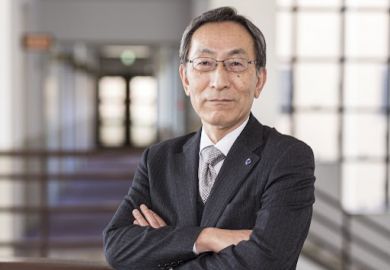A Turkish rector with close ties to the country’s ruling party, whose appointment has sparked days of protest from staff and students, was under scrutiny from two journals after critics accused him of multiple counts of plagiarism.
Melih Bulu, who ran for election to parliament in 2015 for the ruling Justice and Development Party (AKP), was announced as head of Boğaziçi University in Istanbul on 1 January by Turkey’s president, Recep Tayyip Erdoğan.
Fearing that the move will further erode academic freedom and tighten the government’s grip over Boğaziçi, faculty have refused to accept Dr Bulu as rector, with dozens of academics turning their back on his campus building in a symbolic protest. Academic unions at several universities in the UK have urged solidarity with the protests.
Students have also held days of demonstrations, and have been met by police on campus and reported raids on student protesters’ homes.
Criticism of Dr Bulu has focused on his links to the governing party and to the fact that he has been appointed from outside the university, which Boğaziçi faculty say is unprecedented since the military dictatorship of the 1980s.
Under Mr Erdoğan, who since 2018 has assumed complete control over university rector appointments, academic freedom has been steadily squeezed. A study released last year found that dozens of Turkish rectors now tweet in support of the government but themselves have no international research record.
Dr Bulu has also faced scrutiny of his academic record as an urban geographer, with multiple accusations on social media of plagiarism.
In one article from 2011, he appears to have almost copied and pasted passages from two previously published articles. Although he cites the original papers, he does not put quotation marks around the passages in question.
Javier Carrillo, the editor of the International Journal of Knowledge-Based Development, said the journal had been alerted to the accusations and was investigating.
A 2015 paper co-authored by Dr Bulu also appears to have taken two passages from the abstracts of two earlier articles. Again, the original reference is provided, and some of the text is modified, but the passages are not put into quotation marks.
Jamie Peck, managing editor of Environment and Planning A, where this article appeared, said these accusations would be investigated. Dr Bulu’s co-author, Tan Yigitcanlar, an associate professor at the Queensland University of Technology, did not respond to a request for comment.
The controversy over the appointment shows no sign of dying down, with Dr Bulu appearing on Turkish television to defend himself, trying to reassure students that he will not upend the university’s culture, stressing that he is a fan of Metallica – prompting further campus protests by students to the backdrop of heavy metal music.
Dr Bulu did not reply to a request for comment before Times Higher Education’s deadline, but he has reportedly described allegations of plagiarism as “lies”. Boğaziçi also failed to respond when asked whether it would investigate accusations of plagiarism in Dr Bulu’s doctoral thesis, which he completed at the institution.




